In a world where plant-based options are often met with skepticism, the tantalizing flavors of Vegan/Vegetarian Ramen and Gyouza are here to challenge the status quo.
Imagine a steaming bowl of savory broth filled with chewy noodles and topped with an array of vibrant vegetables, all paired with perfectly crispy dumplings bursting with flavor.
But how does one recreate these iconic Japanese dishes without compromising taste or authenticity? The secret lies in the careful selection of ingredients and the art of balancing flavors to create a culinary masterpiece that will leave taste buds tingling for more.
Key Points
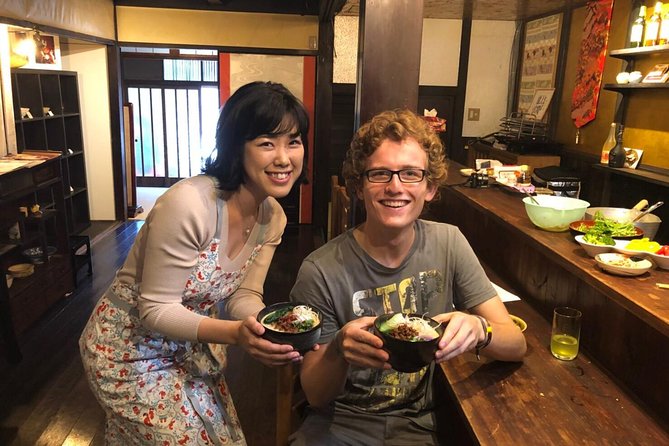
- Enjoy the rich umami of miso ramen paired with fresh, slightly spicy vegetable gyoza.
- Vegan/vegetarian cooking offers health benefits, reduces environmental impact, and is budget-friendly.
- Perfect the art of vegan gyoza with fresh ingredients and attention to detail.
- Pair crispy, pan-fried gyoza with flavorful ramen for a vibrant, nutritious dining experience.
It's also worth checking out some other tours and experiences nearby.
Ramen and Gyouza: A Vegan Delight
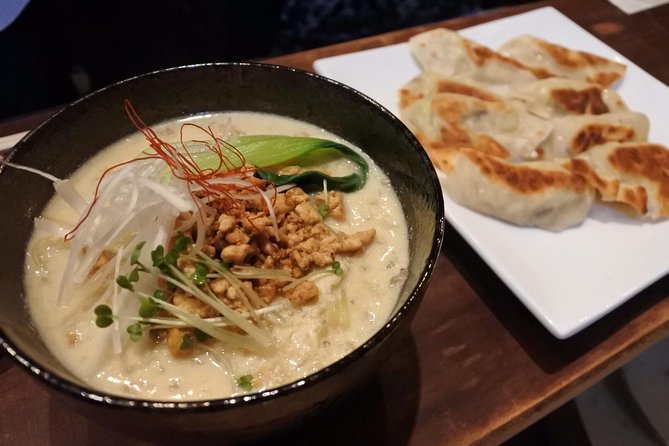
When diving into the world of vegan/Vegetarian Ramen and Gyouza, one can expect a culinary adventure that tantalizes the taste buds and showcases the essence of Japanese plant-based cuisine. In this vegan diet, sustainability meets the rich flavors of Japanese cuisine, creating a delightful cultural fusion.
Ramen, a beloved Japanese dish, traditionally made with a meat-based broth, gets a vegan twist with flavorful vegetable broths and toppings like tofu, seaweed, and mushrooms. Gyouza, the Japanese version of dumplings, becomes a vegan delight filled with savory plant-based ingredients.
This creative take on traditional Japanese dishes not only offers a delicious dining experience but also promotes sustainable eating practices in line with a vegan lifestyle.
Ingredients for Vegan/Vegetarian Ramen
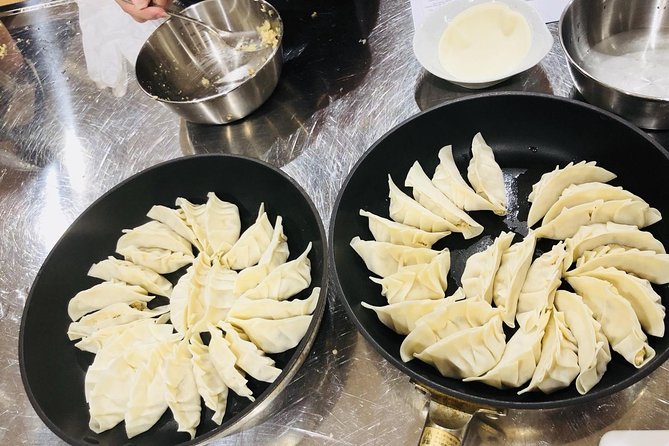
For a delicious and sustainable twist on traditional Japanese cuisine, the vegan/vegetarian Ramen features flavorful vegetable broths and toppings like tofu, seaweed, and mushrooms. When preparing this dish, opting for vegan broth alternatives and meat substitutes can elevate the flavors and textures to create a satisfying meal. Here are some key ingredients commonly used in vegan/vegetarian Ramen:
| Vegan Broth Alternatives | Meat Substitutes |
|---|---|
| Miso paste | Seitan |
| Vegetable broth | Tofu |
| Dried shiitake mushrooms | Textured vegetable protein (TVP) |
These ingredients provide depth and richness to the broth while offering protein-packed alternatives to meat, ensuring a hearty and fulfilling Ramen experience.
Step-by-Step Ramen Cooking Process
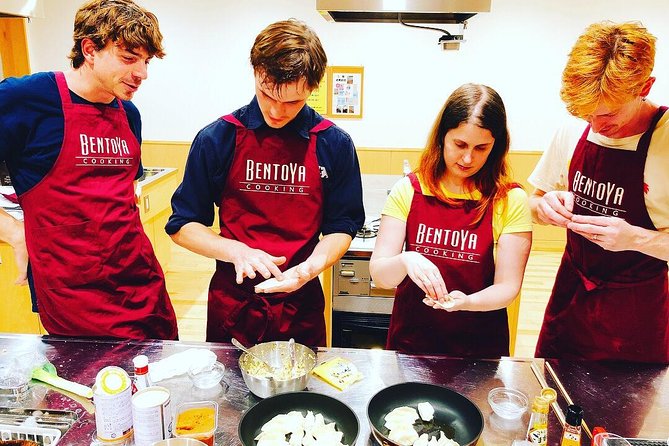
Starting the process by preparing the flavorful broth sets the foundation for crafting a delicious bowl of vegan/vegetarian Ramen. For the broth, simmer vegetable stock with kombu seaweed, dried shiitake mushrooms, soy sauce, and miso paste for depth of flavor.
Next, cook the noodles separately according to package instructions. When assembling the Ramen, consider adding vegan alternatives like tofu, bamboo shoots, nori, and corn for extra texture and taste. Experiment with different cooking techniques like stir-frying or roasting the vegetables for unique flavors.
Play around with flavor combinations by adding garlic, ginger, sesame oil, and chili paste to elevate the taste profile. Finally, remember that presentation is key; top your Ramen with colorful veggies, sliced spring onions, and a sprinkle of sesame seeds for an appealing look.
Tips for Perfect Vegan Gyouza
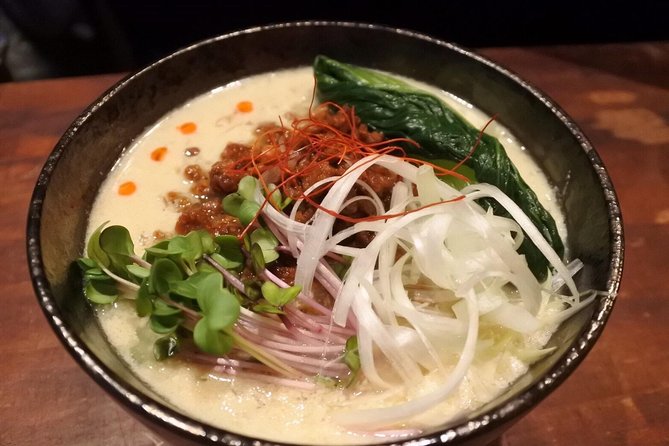
Now moving on to mastering the art of crafting perfect Vegan Gyouza to complement your vegan/vegetarian Ramen feast. When it comes to making Vegan dumplings, attention to detail is key. Here are a few tips to help you achieve Gyouza perfection:
-
Gyouza folding: Ensure the edges are properly sealed to prevent the filling from spilling out during cooking.
-
Use fresh ingredients: Opt for fresh vegetables and herbs to enhance the flavor profile of your Vegan Gyouza.
-
Cooking technique: Pan-fry the Gyouza until they’re golden and crispy on the bottom, then steam to ensure the filling is thoroughly cooked.
Pairing Ramen and Gyouza Flavors

To enhance your dining experience, consider experimenting with different flavor combinations when pairing Ramen and Gyouza for a delightful vegan/vegetarian meal.
When it comes to flavor combinations, try matching the savory umami of miso ramen with the fresh and slightly spicy flavors of vegetable gyoza.
Incorporating various cooking techniques like pan-frying the gyoza for a crispy texture can complement the rich broth of the ramen.
For ingredient sourcing, opt for fresh, seasonal vegetables to enhance the overall taste and nutritional value of your meal.
Presentation tips include serving the gyoza alongside the ramen in a vibrant bowl, adding a pop of color and texture to your dish.
Experimenting with these elements can elevate your vegan/vegetarian ramen and gyoza experience.
Benefits of Vegan/Vegetarian Cooking
Enhancing your culinary skills with vegan/vegetarian cooking not only offers a flavorful twist to traditional dishes but also brings a range of health benefits to your dining table.
-
Health Benefits: Vegan/vegetarian diets are rich in nutrients and can help lower the risk of heart disease, high blood pressure, and certain types of cancer.
-
Environmental Impact: Choosing plant-based ingredients reduces your carbon footprint and helps conserve water and other resources.
-
Budget-Friendly: Vegan/vegetarian cooking can be cost-effective as plant-based proteins are often cheaper than meat products, making it a wallet-friendly choice for home cooking.
Customer Reviews on Vegan/Vegetarian Delights
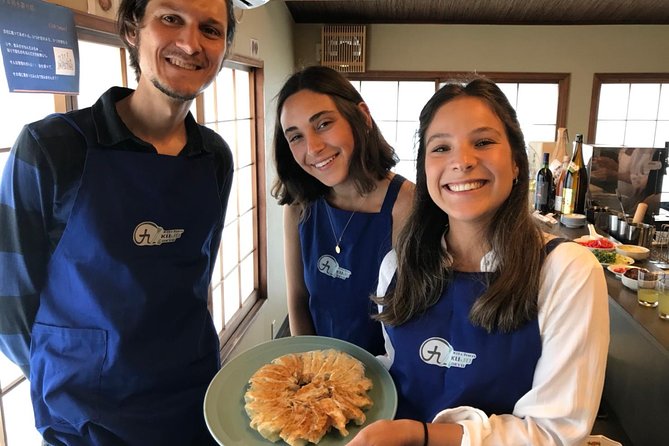
Customers rave about the mouthwatering vegan/vegetarian dishes at BentoYa Cooking, praising the flavorful twists and health benefits of the culinary experience. Many reviews highlight the exceptional customer satisfaction achieved through the plant-based options offered.
Customers appreciate the diverse range of flavors and textures present in each dish, creating a memorable dining experience. The plant-based options not only cater to vegans and vegetarians but also attract those looking to explore healthier food choices.
Reviewers often mention how the dishes at BentoYa Cooking exceed expectations, with some describing them as the best vegan/vegetarian meals they’ve ever tasted. The positive feedback emphasizes the quality and taste of the plant-based offerings, making BentoYa Cooking a must-visit for those seeking delicious vegan and vegetarian delights.
Here's a few more nearby tours and experiences we think you'll like.
Common questions
Can I Request Specific Dietary Restrictions or Ingredient Preferences for the Cooking Class?
Yes, travelers can request ingredient customization based on dietary preferences for the cooking class. This allows for flavor enhancement and learning umami secrets. The class offers flexibility to cater to various tastes and dietary needs.
Are There Options for Gluten-Free or Soy-Free Alternatives in the Recipes Provided?
Yes, there are options available for gluten-free or soy-free alternatives in the recipes provided. Nut-free options and oil-free alternatives can be accommodated upon request. The cooking class ensures a tailored experience for various dietary needs.
Do You Offer Any Tips for Making the Ramen Broth More Flavorful or Rich in Umami Without Using Meat-Based Ingredients?
When looking to enhance the flavor of broths without meat, adding ingredients like kombu, shiitake mushrooms, miso, soy sauce, and nutritional yeast can unlock umami secrets. Experiment with veggie ramen and savory tricks for a satisfying meal.
Is There a Recommended Substitute for Eggs in the Gyouza Recipe for Those Following a Vegan Diet?
For those following a vegan diet, a great substitute for eggs in gyouza is using a mixture of tofu and cornstarch. This vegan-friendly option maintains the texture and binding properties needed in the dumplings.
Are There Any Recommendations for Side Dishes or Accompaniments to Serve With the Vegan/Vegetarian Ramen and Gyouza for a Complete Meal Experience?
For a complete meal experience, flavorful pairings like stir-fried vegetables or kimchi can complement the ramen and gyouza. Incorporating nutritious sides such as edamame or seaweed salad adds an Asian fusion touch. Try simple cooking techniques to enhance the overall dining experience.
Not for you? Here's more of our most recent tour reviews happening neaby
- 1Day Tokyo Backcountry Okutama With E-Bike
- Tokyo Seasonal Peaks Discovery
- Private Transfer From Tokyo Hotels to Tokyo Cruise Port
- Tachikawa to Tokyo Airport (HND) – Departure Private Transfer
- Tokyo Self Guided Sherlock Holmes Murder Mystery Game
- Mt. Fuji and Lake Kawaguchi Day Trip With English Speaking Driver
- Japanese Culture Experience With Tea Ceremony and Yukata in Tokyo
- Home-style Japanese Dish Cooking Class in Tokyo
- Easy for Everyone! Now You Can Play Handmade Mini Shamisen and Show off to Everyone! Musical Instrum
- One Day Tour of Tokyos Plentiful Nature in Hinohara Village
- Create Autumn Tea in Wild West Tokyo
- Tachikawa City to Tokyo Haneda Airport (HND) – Departure Private Transfer
- Small-Group Walking Tour With Udon Cooking Class in Hino
- Sanrio Puroland Tokyo Admission
- Japan Unlimited WiFi Router – Free Delivery to Anywhere in Japan
Sum Up
To sum it up, learning to create Vegan/Vegetarian Ramen and Gyouza dishes at BentoYa Cooking is a must-do for any foodie visiting Tokyo.
The hands-on experience, friendly atmosphere, and delicious plant-based ingredients make this culinary adventure one to remember.
Whether you’re a seasoned vegan or just looking to try something new, this cooking class offers a unique and flavorful insight into Japanese cuisine that won’t break the bank.
Don’t miss out on this tasty experience!






